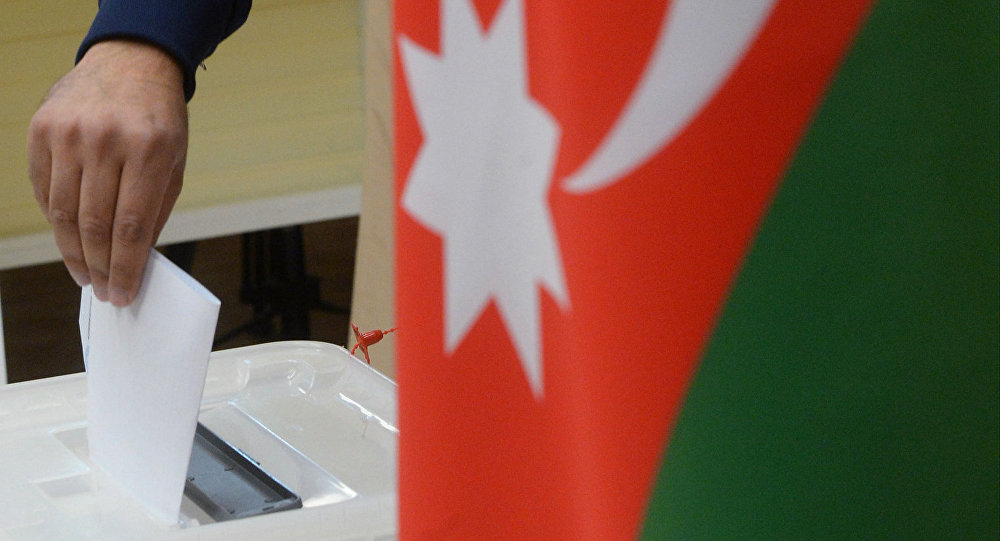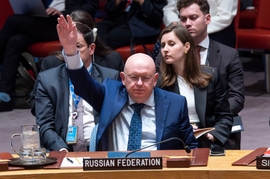Snap presidential elections are scheduled to take place in Azerbaijan in 2024, as per the order signed by President Ilham Aliyev on Thursday.
According to the order, the Central Elections Committee of Azerbaijan is instructed to undertake necessary measures for the polls, set to occur on February 7.
No official statement regarding the reasons for the snap elections followed the presidential order.
The upcoming polls will occur one year earlier than the Constitutional termination of President Aliyev’s current term in 2025.
The last presidential elections in Azerbaijan were held in 2018, half a year earlier than the scheduled date, securing the new term for President Aliyev.
As a result of the referendum held in 2016, the Constitution of Azerbaijan was amended to extend the presidential term from 5 to 7 years.
Political analysts in Azerbaijan have weighed in on the possible reasons for the announcement of the snap elections in the country.
Elkhan Shahinoglu, Head of the Baku-based ATLAS Research Center, identifies possible factors for the unexpected order of President Aliyev.
“The first factor, for sure, is related to the restoration of Azerbaijan’s territorial integrity, as well as its sovereignty over the Karabakh region,” Shahinoglu told Caspian News.
The decades-old conflict between Armenia and Azerbaijan took a violent turn on September 27, 2020, after Armenia’s forces illegally deployed in the occupied Azerbaijani lands shelled military positions and civilian settlements of Azerbaijan. During the counter-attack operations that lasted 44 days, Azerbaijani forces liberated about 300 settlements, including the cities of Jabrayil, Fuzuli, Zangilan, Gubadli, and Shusha, from nearly 30 years of illegal Armenian occupation. The war ended in a tripartite statement signed on November 10, 2020, by Armenia, Azerbaijan, and Russia. Under the statement, Armenia also returned the occupied Aghdam, Kalbajar, and Lachin districts to Azerbaijan.
The victory in the war de-facto restored the territorial integrity of Azerbaijan, reclaiming control over the country’s entire borderline, including the largest portion with Armenia and a part with Iran.
Meanwhile, Armenia refused to withdraw the remnants of its military from certain parts of Azerbaijan’s Karabakh region temporarily monitored by the Russian peacekeeping contingent after the war. The Azerbaijani side officially declared that Yerevan illegally kept a 15,000-strong army personnel within the country’s borders. Numerous calls for immediate withdrawal were to no avail, leading to the short but bloody re-escalation of hostilities.
Azerbaijan Armed Forces launched local anti-terrorist measures on September 19, 2023, to neutralize illegal Armenian armed formations and their military infrastructure in the Karabakh region. The operation came on the heels of intensifying Armenian attacks on Azerbaijani positions and almost daily fatal landmine incidents. By the time of the cessation of hostilities after 23 hours on September 20, the Azerbaijani military disabled artillery systems, radio-electronic warfare, military equipment, ammunition depots, military strongholds, and shelters of the Armenian army formations stationed in the Karabakh region. In addition, more than 90 combat posts and strategically important positions of the Armenian military formations were taken under control during the one-day operation until September 20. No civilians or civilian infrastructure were targeted during the operation.
On September 20, the illegal separatist regime requested through the Russian peacekeeping command to cease the local anti-terror activities by agreeing to withdrawal and complete disarmament of the Armenian armed formations. On September 28, the separatist regime announced self-dissolution. President Aliyev hoisted the state flag of Azerbaijan in Khankendi, the Karabakh region on October 15 announcing the restoration of sovereignty across the entire internationally recognized landmass of Azerbaijan.
In the meantime, political analyst Elkhan Shahinoglu says that, in addition to the restoration of territorial integrity and sovereignty, the second factor to explain the upcoming snap elections in Azerbaijan could be linked with the geopolitical situation in a greater region next year.







 Azerbaijan and Armenia started the process of demarcation of their border on Tuesday, with the installation of the first border markers based on ge...
Azerbaijan and Armenia started the process of demarcation of their border on Tuesday, with the installation of the first border markers based on ge...
 Armenian sappers commenced on Monday mine-clearance operations in the territories adjacent to the Saint Mary Church in village of Voskepar (Armenia...
Armenian sappers commenced on Monday mine-clearance operations in the territories adjacent to the Saint Mary Church in village of Voskepar (Armenia...
 Iran and Pakistan have signed eight cooperation documents in various fields, and agreed to strengthen ties to fight terrorism in the region.
Iran and Pakistan have signed eight cooperation documents in various fields, and agreed to strengthen ties to fight terrorism in the region.
 As the conflict between Ukraine and Russia escalates, the strategic importance of Kharkiv, Ukraine's second-largest city, has come sharply into focus.
As the conflict between Ukraine and Russia escalates, the strategic importance of Kharkiv, Ukraine's second-largest city, has come sharply into focus.
 President Aliyev emphasized the critical role of the North-South Transport Corridor in fostering transport cooperation between Azerbaijan and Russi...
President Aliyev emphasized the critical role of the North-South Transport Corridor in fostering transport cooperation between Azerbaijan and Russi...



